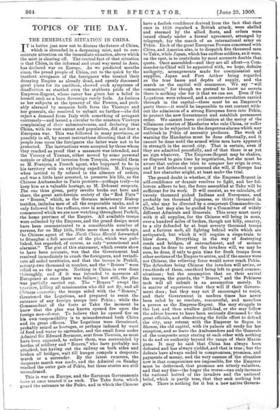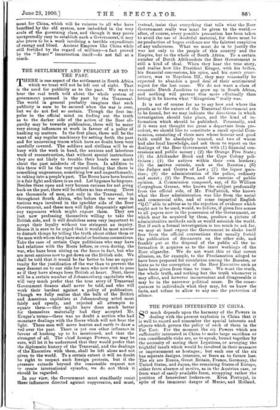TOPICS OF THE DAY.
THE IMMEDIATE SITUATION IN CHINA.
IT is better just now not to discuss the future of. China, which is shrouded in a deepening mist, and to con- centrate attention on the immediate situation, above which the mist is clearing off. The central fact of that situation is that China, in the informal and cruel way usual in Asia, has declared war on Europe. As we predicted months since, the proud people of China, cut to the quick by the insolent arrogance of the foreigners who treated their decaying Empire as already dead, and openly discussed great plans for its partition, showed such symptoms of disaffection as startled even the stubborn pride of the Empress-Regent, whose career has given her a belief in herself such as a born Sovereign rarely feels. As furious as her subjects at the tyranny of the Powers, and prob- ably alarmed by menaces both from the Viceroys and her generals, she resolved to submit no farther—she did reject a demand from Italy with something of arrogant contumely—and issued a circular to the nineteen Viceroys complaining of their submissiveness, and declaring that China, with its vast extent and population, did not fear a European war. This was followed in many provinces, or possibly in all, by secret instructions directing that if the people rose upon the foreigners the latter were not to be protected. The instructions were accepted by those whom they reached as proof that a massacre was intended, and the Viceroy of Yunnan, either moved by some personal scruple or afraid of invasion from Tonquin, revealed them to M. Francois, a French agent, who happened to be in his territory with an exploring expedition. M. Francois when invited to fly refused in the absence of orders, and was a little later arrested, to preserve his life, as the Chinese Ambassador in Paris protests—perhaps truly—to keep him as a valuable hostage, as M. Delcassi suspects. The cue thus given, petty revolts broke out here and there, the great anti-foreign society of the " Red Fists " or " Boxers," which, as the German missionary Bishop testifies, includes men of all the respectable ranks, and is only followed by the ruffians, rose in arms, and the scene commenced which we are now watching throughout Pechili, the home province of the Empire. All available troops were collected by the Empress, and the grand design must have been communicated to a considerable number of persons, for on May 16th, little more than a month ago, the Chinese agent of the North China Herald forwarded to Shanghai a full account of the plot, which was pub- lished, but regarded, of course, as only "sensational and alarmist." The gist of this statement, which events show to have been accurate, was that the Government had resolved immediately to crush the foreigners, and revindi- cate all ceded territories, and that the troops in Pechili, seventy-two thousand in number, and the " Boxers " were relied on as the agents. Nothing in China is ever done thoroughly, and if it was intended to massacre all Europeans at once there was failure ; but still, the plan was partially carried out. The " Boxers " swept the province, killing all missionaries who did not fly, and all Chinese converts ; the troops sided with the "Boxers," threatened the Legations, and prepared to resist the entrance of any foreign troops into Pekin ; while the Commandant of the forts at Taku the moment he knew that the plan was known opened fire upon the foreign men-of-war. To believe that he opened fire on his own tresponsibility is to misunderstand both China and its great officers. The Legations were threatened, probably seized as hostages, or perhaps induced by want of food and water to surrender, and the small force under Admiral Sir Edward Seymour, sent from Tientsin, as must have been expected, to relieve them, was surrounded by hordes of soldiery and " Boxers," who have probably not attacked, but having cut the railway on both sides and broken all bridges, wait till hunger compels a desperate march or a surrender. By the latest rumours, the desperate march was made, and the Admiral on Sunday reached the outer gate of Pekin, but these stories are still unconfirmed.
This is war on Europe, and the European Governments have at once treated it as such. The Taku forts. which guard the entrance to the Peiho, and in which the Chinese have a foolish confidence derived from the fact that they once in 1858 repulsed a British attack, were shelled and stormed by the allied fleets, and orders were issued clearly under a formal agreement, arranged by telegrapb, for the march of an international army on Pekin. Each of the great European Powers concerned with China, and America also, is to despatch five thousand men to Taku, while Japan, which has endless soldiers, as it were, on the spot, is to contribute by most accounts double that quota. Once assembled—and they are all afloat—a Com- mander-in-Chief will be appointed with, we hope, definite authority, arrangements made for commissariat and supplies, Japan and Port Arthur being regarded as the true bases and depots of supply, and the march on the capital will commence. We say " will commence," for though we pretend to know no secrets there is nothing else for it that we can see. Even if the Legations were released, and a counter-revolution carried through in the capital—there must be an Emperor's party there—it would be impossible to rest content with- out the admission of a strong European force into Pekin, to protect the new Government and establish permanent order. We cannot leave civilisation at the mercy of the villainous coteries of Mandarins who rule China, or suffer Europe to be subjected to the dangerous alarms which any outbreak in Pekin of necessity produces. The work of warning the Mandarins must be done effectually, and it cannot be done until the armed white men have appeared in strength in the sacred, city. That is certain, even if they are admitted peacefully, and of that there is as yet no sign whatever. The Empress-Regent may be shaken, or disposed to gain time by negotiation, but she must be aware that unless she tries to conquer her reign is over, and if not dethroned or poisoned she will, if Europe has read her character aright, at least make the trial.
The grand doubt is whether, if the Empress-Regent in self-confidence or' despair resolves to fight, and her fol- lowers adhere to her, the force assembled at Taku will be sufficient for its work. It will consist, as we calculate, of twenty thousand picked Indians and Europeans, and probably ten thousand Japanese, or thirty thousand in all, who may be directed by a competent Commander-in- Cbief, but may also be guided by a Committee of widely different Admirals and Generals. This army must carry with it all supplies, for the Chinese will bring in none, over a hundred miles of broken, though not hilly, country, to a city defended by at least seventy thousand troops and a furious mob, all fighting behind walls which are antiquated, but which it will require a siege-train to blow down. Everything in the way of destroying roads and bridges, of entrenchment, and of menace that can be done to arrest the invaders will, we may be sure, be done, if only to gain time for fresh troops from other sections of the Empire to arrive, and if the enemy were not Chinese, the relieving force would never reach Pekin. The defenders being Chinese the invaders will arrive, or two-thirds of them, one-third being left to guard commu- nications; but the assumption that on their arrival the troops, the guards, the " Boxers," and the Pekinese mob will all submit is an assumption merely. It is matter of experience that they will if their Govern- ment does ; but they may not if encouraged to resist, and their Government in modern times has never been ruled by so resolute, resourceful, and merciless a person as the Empress-Regent. She may struggle to the last and then swallow gold-leaf, or she may follow the advice known to have been seriously discussed by the great officials, and abandoning the futile effort to defend the city, may retreat with the Emperor to Segan in Shense, the old capital, with its palaces all ready for her reception, and so leave the Ambassadors and the Generals of the composite army staring at each other with nothing to do and no authority beyond the range of. their Maxim guns. • It may be said that China has always been defeated and has always yielded, and that is true ; but the defeats have always ended in compromises, promises, and payments of money, and the very essence of the situation now is that compromises are impossible, for the Empress must be dethroned, that promises are utterly 'valueless, and that any fine—the huger the worse—can only increase the national hatred of the invaders and the national belief, which is partly true, that they seek nothing but gain. There is nothing for it but a new:native Goirera. meat for China, which will be ruinous to all who have benefited by the old system, now imbedded in the very souls of the governing class, and though it may prove unexpectedly easy to establish such a Government, it may also prove to be a work involving a terrible expenditure of energy and blood. Ancient Empires like China while still fortified by the regard of millions—a fact proved by the " Boxer " insurrection itself—do not fall at a touch.



































 Previous page
Previous page